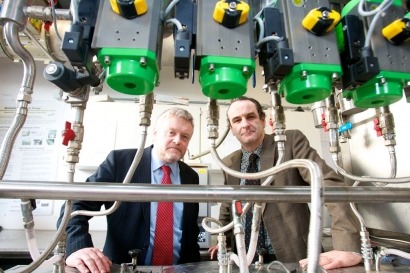
The ERI and Bord Gáis, which is responsible for the supply, transmission and distribution of natural gas in Ireland, have been working together for some time and recently issued a report entitled “The Future of Renewable Gas in Ireland”. The report outlined that the potential resource of renewable gas in Ireland is sufficient to provide for 10% of transport fuel or 40% of natural gas used in houses.
“There is no silver bullet when it comes to fuels of the future,” said Dr Jerry Murphy, Principal Investigator in Bioenergy and Biofuels at the ERI. “Renewable gas (also called biomethane) has a significant role to play. Detailed research is required into the numerous biomethane feedstocks (algae, grass, household waste, slurries) and the most efficient technology available to convert these feedstocks to renewable gas.”
“A renewable gas laboratory is a requirement for a renewable gas industry. Countries with renewable gas industries such as Germany, The Netherlands, and Switzerland, all have University research laboratories available to industry. This expanded laboratory in the ERI will provide the necessary experimental facilities for this new industry and will provide the necessary knowledge base to help the industry grow.”
“We have investigated the sustainability of producing biomethane from a range of feed stocks such as organic waste materials and non-food crops. We have shown that biomethane is far superior to first generation liquid biofuels such as ethanol and biodiesel. Of huge benefit is the fact that the gas can be injected to the natural gas grid and used as a transport fuel in natural gas vehicles (NGV). The gas grid is the distribution system for the fuel, negating the need for on road tankers,” he added.
“We are looking forward to working with the ERI and encourage all interested parties to work together to ensure that biomethane can become a key contributor to meeting Ireland’s renewable energy targets, said John Barry Managing Director of Bord Gáis Networks. “Bord Gais have previously funded two PhD students in the ERI on this topic and this latest funding indicates the on-going commitment of BGN to renewable gas and to funding of research in the green tech sector in Ireland.”
Bord Gáis, and the UCC worked with Ernst & Young to produce the The Future of Renewable Gas in Ireland report which outlines how grass and waste can be converted into natural gas that can then be used locally or piped into the national grid for distribution around Ireland. The report estimates that 7.5% of Ireland’s natural gas demand could be met by renewable gas, the equivalent of heating 300,000 homes each year.
“Capturing this renewable gas resource would be a considerable step in addressing Ireland’s challenging renewable energy and waste management objectives and in reducing our dependence on energy imports,” Bord Gáis said on its website. The technology is already in use in other countries: for example, farmers in Denmark and Germany have formed co-operatives to finance, build and run such renewable gas facilities. In Stockholm, the city treats municipal waste to create natural gas for use as a transport fuel. This would be an option in Ireland also, as Bord Gáis is currently trialling a production-line natural gas vehicle in its fleet.
[Inset: Jack O’Connell, Head of Regulation and Commercial at Bord Gáis Networks, and Dr Jerry Murphy, Principal Investigator in Bioenergy and Biofuels at the Environment Research Institute]
For additional information:

